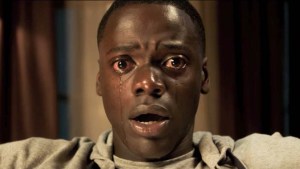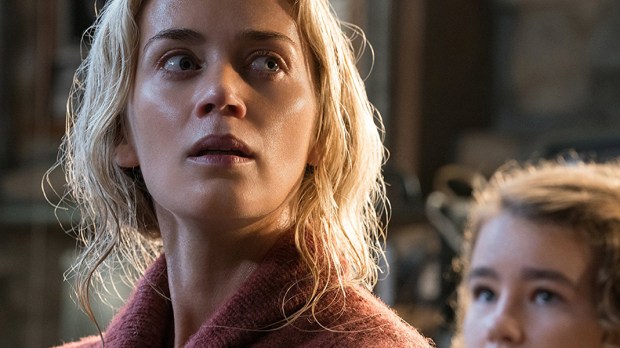Lenten Campaign 2025
This content is free of charge, as are all our articles.
Support us with a donation that is tax-deductible and enable us to continue to reach millions of readers.
A Quiet Place made quite a racket last weekend, at least in Paramount’s accounting office. The horror film directed by John Krasinski and starring him and his wife, Emily Blunt, earned $50 million, and its rave critical success suggests it could be making noise for weeks to come.
But as the name suggests, the movie itself is hardly your typical Hollywood horror bombast. Indeed, silence is more than simply golden in A Quiet Place: It is the difference between life and death.
Strange creatures have invaded earth from who-knows-where, and civilization apparently lies in ruins at their feet. They’re completely blind, but no matter: Their sense of hearing is so acute, and their armor so strong, that survivors have just one hope: Live the rest of their lives in almost complete silence to keep from drawing the creatures’ attention.
The Abbots know full well how swift and vicious these beasts can be. Months earlier, their youngest son — too young to know better — turned on a noisy toy he came across, and that was the last thing the kid ever did. But the rest of the family still survives: Lee, wife Evelyn, daughter Regan and son Marcus. Oh, and there’s another little one on the way — a baby born in a world in which the tiniest cry might mean the end.
The movie offers a lot of complexity within its simple premise and taut, 90-minute runtime. We could talk about a lot of things in this space, but I’d like to focus on one of the most obvious, but richest, elements in A Quiet Place: The quiet.
The movie is silent for long stretches. The family communicates almost completely through signs and signals. They walk along specially made sand pathways barefoot, too keep the noise to a minimum. Every brush of cloth, every rustle of leaf, sets even the viewer’s teeth on edge. I swear, in the movie showing I saw, folks let their popcorn grow cold just so the monsters on screen wouldn’t hear them chew.

Read more:
‘Get Out’: A horror film takes on bigotry of all kinds
The best horror movies play on the things that scare us already. And while all of us would be rightfully terrified of these larged-eared critters, silence itself can be strangely terrifying, too. I’ve seen enough horror movies to know that the most tense moments aren’t when the music crescendos: It’s when it stops.
When I was a teen, my parents used to go to bed before I did, and I’d be responsible for turning off all the lights and locking the doors. Those nights scared me — not because each light I turned off brought the house closer to total darkness, but because of the silence that followed me through room and hall. The silence told me I was alone.
We live in a particularly noisy age. We seem to need sound — constant, unflagging stimulation for not just our ears, but our eyes, as well. We dread pauses in conversation. We have a hard time sitting in a quiet room without looking for a screen to turn on and distract us. I can’t even go to the bathroom without bringing my phone. Even as I write this — an activity that you’d think would benefit from a little peace and quiet — I have a baseball game on for background noise.
We’re always scared of “the other.” And in a cacophonous world, silence itself is the other.
But silence is intimate, too. In our rare moments when we find it, we can more easily hear who we are and who we’re meant to be. We find our priorities. We find companionship. Sometimes, I believe we find God.
In 1 Kings 19, we’re told that Elijah heard God not in fire or earthquake, but in a “still small voice.” In Psalms 46, He tells us, “be still, and know that I am God.”
For millennia, Christians have heeded those words. For Benedictine monks and nuns, observed to clear away mental and emotional clutter to better hear and heed the will of God. Theophilus, patriarch of Alexandria way back around the year 400, said that monks should “love silence and the Catholic faith, for nothing at all is more important than these two things.”
Silence is hard for us. Scary, even. But it’s also beautiful. We see that in A Quiet Place’s quiet moments. The family walks through beautiful forests, barefoot, the hushed footfalls blending imperceptively with the sound of the air breathing through the trees. They play board games quietly by the light of a lantern, using soft, cloth game tokens. They communicate through looks, gestures and signs: Every thought is literally unspoken, but visible, and all the more poignant.
And when they eat, they hold hands and bow their heads in prayer — each talking with God silently, separate yet together.
No screeching television. No caterwauling phone. No noise to distract Mom and Dad, daughter and son, from what’s really important in their lives: Each other. And, if the prayer is any indication, God, too. Their world is rife with danger, but they’re blessed, and they know it — blessed beyond measure.
It’s telling, I think, that even in a place where the slightest sound can mean danger, Lee and Evelyn are determined to bring another baby into the world. Life, even life lived in such dire circumstances, is precious. It’s worth living.
The more bucolic moments of A Quiet Place remind me of the times I’ve felt closest to my own children — hiking through the Colorado mountains, maybe, or jogging beside a river. We talk, of course, but the conversation is almost secondary to simply being there, together. We hear our feet strike dirt. Hear our own breathing. Hear the sounds of God’s creation around us, feeling the sun on our faces and the breeze on our arms.
Sometimes, I think we’re most ourselves when we’re not saying a word. We’re not preening. We’re not pretending. We’re not scolding or yelling or teaching or apologizing. We simply … are. And in that silence, we’re reminded how precious that is.
Read more:
Heartbreak: The Quiet Things You Carry While Your Soul Cries Out

